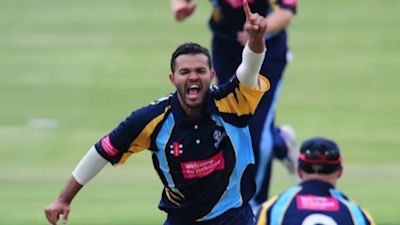Cricket announces 12-point plan to tackle racism

ITV News Sports Editor Steve Scott outlines the key points from the plan - and the storm that has led to this moment
Cricket bosses have announced a new 12-point plan they hope will help combat racism in the sport.
The plan aims to tackle issues including dressing room culture and end the barriers that prevent minorities progressing into the professional game.
The announcement comes in the aftermath of Azeem Rafiq appeared in front of the Digital, Culture, Media and Sport select committee where he detailed in depth his own experiences of racism in cricket.
A new anti-discrimination unit will be created within six months by the ECB, which will be given sufficient scope and funding to tackle discrimination.
Tom Harrison, ECB Chief Executive Officer, added: “For cricket truly to ‘connect communities and improve lives’ – our stated aim at the ECB – we must start by accepting that not enough has happened to make our game better, both inside our own walls and across the wider game.
"That is the only possible reaction to the powerful testimony of Azeem Rafiq and others in recent weeks.
“I am delighted that this plan represents the whole game coming together to commit to tangible action and meaningful change.
"Our role as the ECB will now be to acknowledge the changes that need to be made internally, as well as offer support, resource, and funding to assist the game in making these changes.
"We look forward to working with our partners across the game to create a stronger, more inclusive sport and build back the trust of everyone who loves cricket.”
The 12-point plan in full:
Understanding and educating more
1: Adoption within three months of a standardised approach to reporting, investigating, and responding to complaints, allegations, and whistleblowing across the game.
2: Full promotion of the aims of the Independent Commission for Equity in Cricket (ICEC) through proactive engagement with its investigations and recommendations.
3: Ongoing EDI training for all those who work in cricket, including all staff, volunteers, recreational club officials, umpires, directors, and coaches.
Dressing room culture
4: A full review of dressing room culture in all men's and women's professional teams, both domestic and international.
5: Delivery of a redesigned programme of player and coach education, addressing any gaps identified through the dressing room review.
Removing barriers in talent pathways
6: Action to aid progress into professional teams of people from diverse backgrounds (especially South Asian, Black and less privileged youngsters) through measures to address i) talent identification and scouting, ii) education and diversity of coaches and iii) targeted support programmes for players from diverse or under-privileged backgrounds.
Creating welcoming environments
7: A full-scale review, in advance of the 2022 season, into the detection, enforcement, and sanctions against discriminatory and abusive crowd behaviour at each of our professional cricket grounds.
8: Delivery of plans (tailored to local communities) to ensure professional cricket venues are welcoming to all, including provision of accessible seating, food and beverage offering catering to all faiths and cultures, and the availability of facilities such as multi-faith rooms and alcohol-free zones.
9: Upgraded education in recreational cricket to ensure players, volunteers and coaches understand and champion inclusion and diversity in the game.
Publishing local Equity, Diversity, and Inclusion action plans within six months
10: A commitment to best practice governance with targets for Board diversity (30% female, locally representative ethnicity by April 2022) and plans to increase diversity across the wider organisation. (Compliance will be subject to a “comply or explain” provision to ensure Counties can respect their own governance processes in making the required change).
11: The introduction of fairer recruitment processes through measures including the immediate adoption of anonymised recruitment tools for senior roles, open appointment processes for all roles and the use of balanced and diverse panels to assess interviews.
12: Every senior executive employed across the game will have personal EDI objectives as part of their annual performance targets, driving leadership accountability.